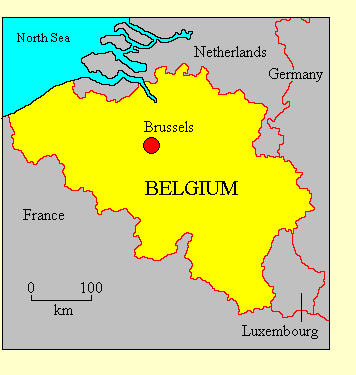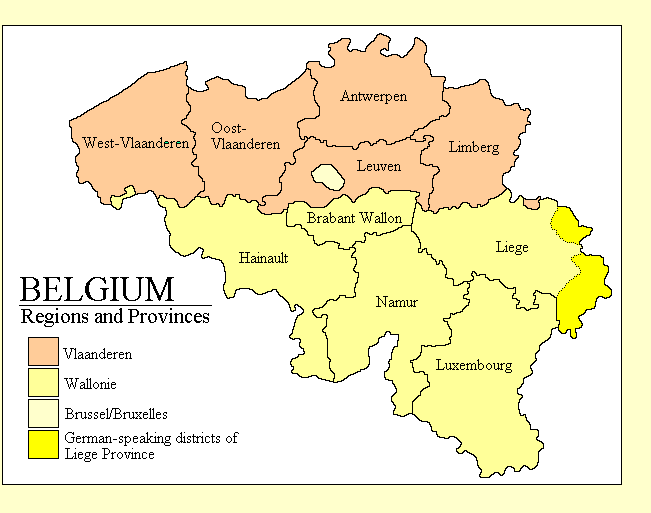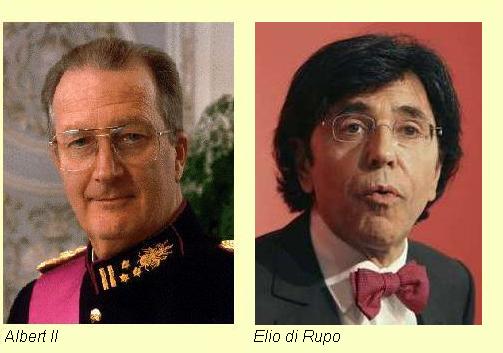
KINGDOM OF BELGIUM• Official name: Koninkrijk Belgie / Royaume de Belgique / Konigreich Belgien (Kingdom of Belgium)
• Electoral authority: The Belgian Interior Ministry administers national elections. • Freedom House 2011 rating: Political Rights 1, Civil Liberties 1 • Transparency International Corruption Index: 71% (22 of 178 countries rated) • Reporters Without Borders Press Freedom 2010 Index: 96.0% (14 of 178 countries rated) • Heritage Foundation Economic Freedom 2010 Index: 70.2% (32 of 178 countries rated) Political historyMost of the lands which now constitute Belgium were acquired by the Spanish Habsburgs in the early 16th century. When the northern Netherlands
became independent, the southern regions remained under Spanish, and later
Austrian, Habsburg rule until 1794, when they were incorporated into the French empire.
In 1815, after Napoleon's defeat at Waterloo outside Brussels, the area became part of a
united Kingdom of the Netherlands under the Dutch king. In 1830 the Belgians rebelled against rule by the
Protestant Dutch, and the Kingdom
of Belgium was created, with Leopold of Saxe-Coburg-Gotha as king. The neutrality of
Belgium was guaranteed by all the powers. It was Germany's violation of Belgian neutrality in 1914
that brought Britain and France into the First World War. Belgium was again occupied by
the Germans in 1940-45.
Belgian politics, historically based on class lines, are now also arranged on linguistic lines. Thus, there is a Flemish Socialist Party Alternative and a Walloon Socialist Party, a Flemish liberal party, the Flemish Liberals and Democrats, and a Walloon liberal party, the Reformist Movement, a Flemish Christian-democrat party, the Christian-Democratic and Flemish Party, and a Walloon Christian-democrat party, the Democratic Humanist Centre. There are even Flemish and Walloon Green parties: Agalev and Ecolo respectively. There are also rival ethnic-chauvinist parties, the Flemish Interest and the Walloon National Front. The Flemish Block advocates the dismemberment of Belgium as well as the exclusion of immigrants. All this, combined with Belgium's system of proportional representation, makes forming Belgian governments very difficult. The Christian Democrats were dominant from 1958 to 1999, but they lost office in 1999 to a centre-left coalition of Liberals, Socialists and Greens under Guy Verhofstadt. The June 2007 election produced a deadlocked result and a prolonged grovernment crisis, not resolved until March 2008, when a new Christian Democrat government was formed by Yves Leterme. He was succeeded by Herman Van Rompuy in December 2008, but following Van Rompuy's election as President of the Europea Council in December 2009 Leterme returned to office. The elections of June 2010 produced another deadlocked parliament, which was followed by an even longer crisis. Leterme remained in office in a caretaker capacity while the parties quarrelled. It took the European debt crisis to end the deadlock: in December 2011 Elio Di Rupo, a Francophone Socialist, formed a government which included Socialists, Liberals and Christian Demovcrats. Updated January 2012 |

